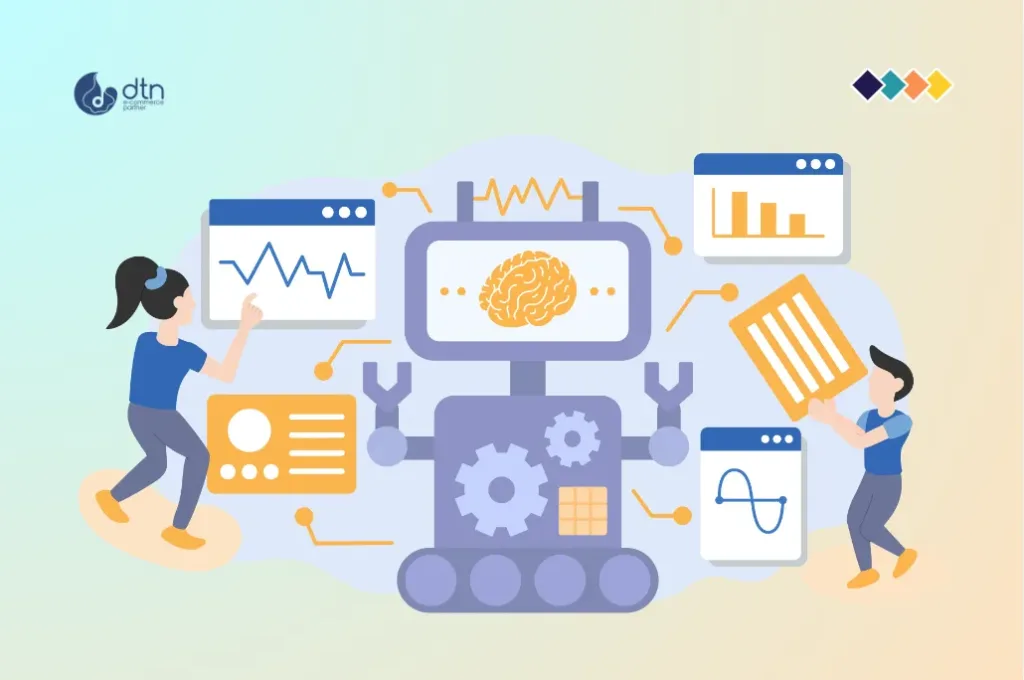Imagine a world where finding the perfect product is as simple as describing it in your own words. No more sifting through endless pages of irrelevant results, no more deciphering cryptic product descriptions. This is the promise of AI-driven product search, a technology that is rapidly changing the way we shop online.
Table of Contents
Beyond Keywords: The Power of Natural Language Processing
Traditional product search relies heavily on keywords. You type in “blue shirt,” and the search engine spits out a list of shirts that contain those words. But what if you want a “comfortable, lightweight blue shirt for a summer picnic?” This is where AI comes in.
Natural Language Processing (NLP) is a field of artificial intelligence that enables computers to comprehend and interpret human language. AI-powered search engines can understand the context and intent behind your query, even if you don’t use precise keywords. They can analyze:
- Synonyms and related terms: “Comfortable” could translate to “soft,” “breathable,” or “loose-fitting.”
- Product attributes: “Lightweight” could indicate a specific fabric type, weight, or style.
- User intent: “Summer picnic” suggests a casual, outdoor setting, influencing the type of shirts presented.
This ability to understand complex language enables AI-driven search engines to deliver more relevant and personalized results.

Personalization at Scale: Tailoring the Shopping Experience
AI goes beyond simply understanding your query; it can also learn from your past behavior and preferences. By analyzing your browsing history, past purchases, and even your social media activity, AI-powered search engines can tailor results to your individual needs.
For example, if you frequently buy hiking gear, an AI-powered search for “jacket” will prioritize results for waterproof, windproof jackets suitable for outdoor activities. This personalized approach significantly improves the shopping experience, making it more efficient and enjoyable.

From Search to Recommendation: A Seamless Journey
AI-driven search is not just about finding the exact product you’re looking for. It can also act as a powerful recommendation engine, suggesting products you might be interested in based on your browsing history, preferences, and even the behavior of other shoppers. This can lead to:
- Discovering hidden gems: You might stumble upon products you never knew existed but are perfect for your needs.
- Increased conversion rates: Relevant recommendations can encourage impulse purchases and lead to a higher average order value.
- Enhanced customer satisfaction: By providing personalized recommendations, you can make your customers feel valued and understood.

The Future of AI-Driven Product Search
The potential of AI-driven product search is vast.
- Voice search integration: With the rise of smart speakers, voice search is becoming increasingly popular. AI-powered search engines can understand natural language and provide relevant results even when spoken.
- Visual search: Imagine taking a picture of a shirt you like and instantly finding similar products online. This is already possible with AI-powered visual search engines, and the technology is continuously evolving.
- Predictive search: AI can anticipate your needs and present suggestions before you even start typing. This can streamline your shopping experience and make finding what you need faster than ever.

Challenges and Considerations
While AI-driven product search offers numerous benefits, it also presents some challenges:
- Data privacy: Collecting and analyzing user data is essential for personalization, but it raises privacy concerns. Ethical data collection and transparent data usage are crucial for building trust.
- Bias and fairness: AI algorithms are trained on data, and if that data is biased, the algorithms can perpetuate those biases. Ensuring fair and inclusive product recommendations requires careful data selection and monitoring.
- User experience: AI-driven search can be overwhelming if it becomes too intrusive or confusing. Balancing personalization with user control is vital for a positive shopping experience.

Conclusion
AI-driven product search is revolutionizing the way we shop online. By understanding natural language, personalizing results, and providing relevant recommendations, AI is making the online shopping experience more efficient, enjoyable, and rewarding. As the technology continues to evolve, we can expect even more innovative and personalized shopping experiences in the future. However, it’s essential to address the ethical and practical challenges to ensure that AI-powered search remains a powerful tool for businesses and a positive force for consumers.
Frequently Asked Questions
We’ve compiled a list of answers to common questions.
What is AI-driven product search and how does it differ from traditional keyword-based search?
AI-driven product search uses Natural Language Processing (NLP) to understand and interpret human language, allowing it to comprehend complex queries and the context behind them. Unlike traditional keyword-based search that relies on specific words, AI-driven search can analyze synonyms, product attributes, and user intent to deliver more relevant and personalized results.
How does AI-driven search enhance personalization in the shopping experience?
AI-driven search can analyze a shopper’s browsing history, past purchases, and social media activity to tailor search results to their individual preferences. For instance, if a user frequently buys hiking gear, searching for a “jacket” will prioritize waterproof and windproof options suitable for outdoor activities.
What are the benefits of AI-driven search acting as a recommendation engine?
AI-driven search can suggest products based on a user’s browsing history, preferences, and the behavior of other shoppers. Benefits include:
- Discovering hidden gems: Users may find products they didn’t know existed but are perfect for their needs.
- Increased conversion rates: Relevant recommendations can lead to impulse purchases and higher average order values.
- Enhanced customer satisfaction: Personalized recommendations make customers feel valued and understood.
What are some future trends in AI-driven product search?
- Voice search integration: AI-powered search engines can understand and provide relevant results for natural language queries spoken through smart speakers.
- Visual search: Users can take pictures of items they like and find similar products online.
- Predictive search: AI can anticipate user needs and present suggestions before the user starts typing, streamlining the shopping experience.
What are the challenges associated with AI-driven product search?
- Data privacy: Personalization requires collecting and analyzing user data, raising privacy concerns. Ethical data collection and transparent usage are essential for trust.
- Bias and fairness: AI algorithms can perpetuate biases present in training data. Ensuring fair and inclusive recommendations requires careful data selection and monitoring.
- User experience: Balancing personalization with user control is vital to avoid making the AI-driven search feel intrusive or confusing.



